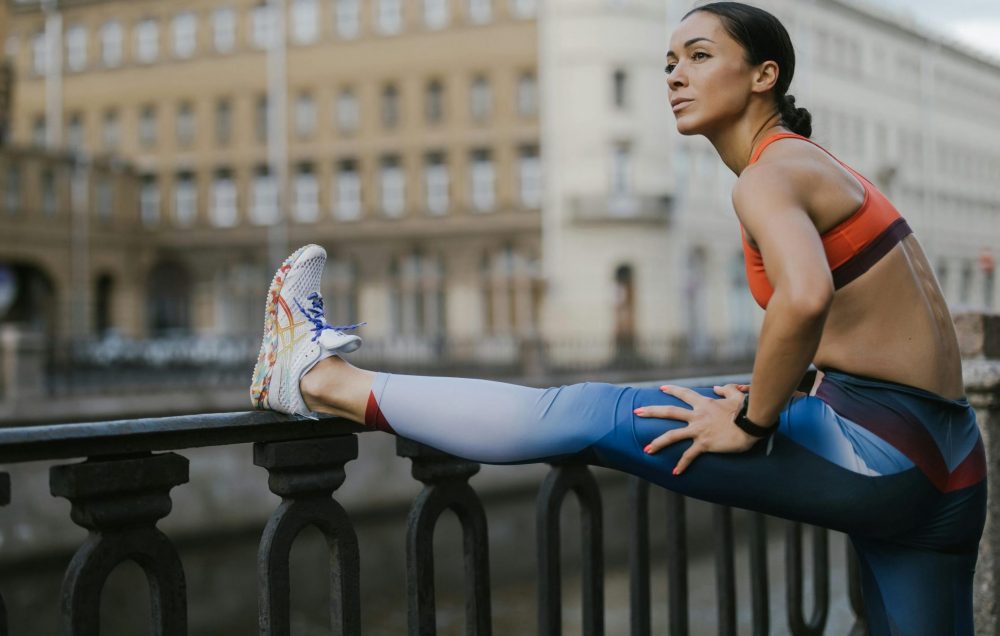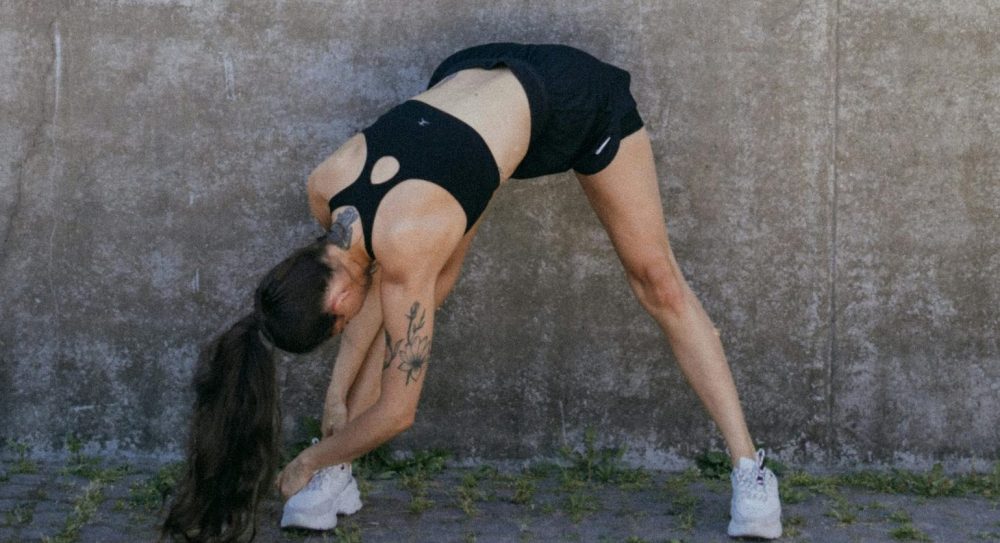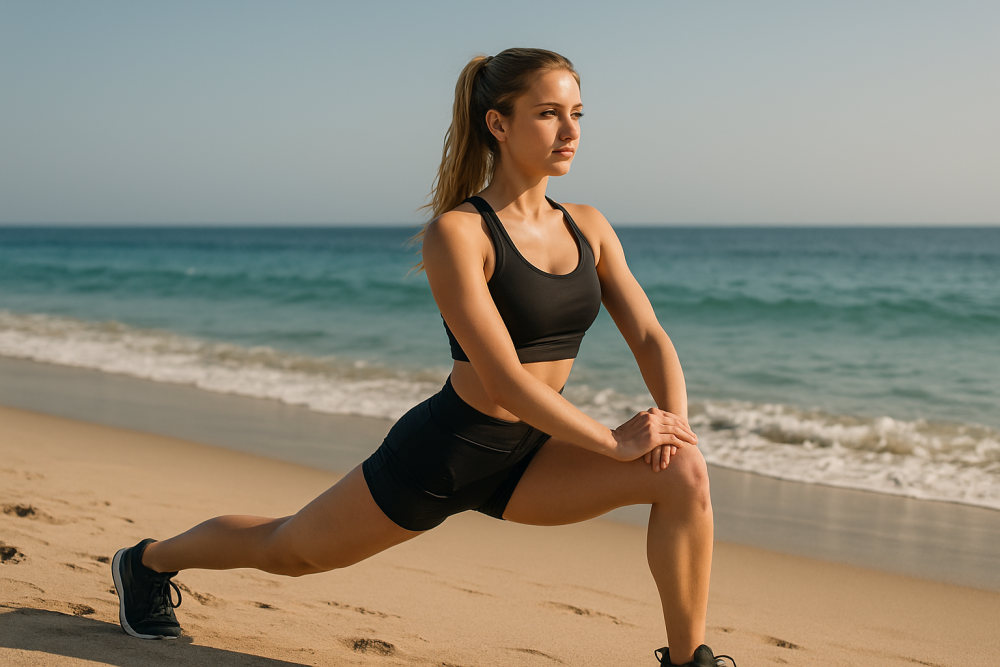Contents
- 1 Runner’s Stretch
- 1.1 Runner’s Stretch: Benefits, Variations, and How to Do It Right
- 1.2 Benefits of the Runner’s Stretch
- 1.3 Recommended Sets and Duration
- 1.4 Runner’s Stretch Step-by-Step Guide
- 1.5 Variations of the Runner’s Stretch
- 1.6 Tips and Recommendations
- 1.7 Frequently Asked Questions
- 1.7.1 What is the Runner’s Stretch?
- 1.7.2 What muscles does the Runner’s Stretch target?
- 1.7.3 When should I do the Runner’s Stretch?
- 1.7.4 Is the Runner’s Stretch good for runners?
- 1.7.5 How long should I hold the Runner’s Stretch?
- 1.7.6 Can beginners do the Runner’s Stretch?
- 1.7.7 Does the Runner’s Stretch help with hip flexor tightness?
- 1.7.8 How often should I do the Runner’s Stretch?
- 1.7.9 What are common mistakes to avoid during the Runner’s Stretch?
- 1.7.10 Can the Runner’s Stretch improve athletic performance?
- 1.8 Final Thoughts
- 1.9 Related
Runner’s Stretch
Runner’s Stretch: Benefits, Variations, and How to Do It Right
If you’re looking for an effective way to target your hamstrings, hip flexors, and calves all at once, the Runner’s Stretch is a must-add to your routine. Whether you’re a runner, martial artist, or fitness enthusiast, this dynamic yet simple stretch can help improve flexibility, enhance range of motion, and reduce the risk of injury.

Benefits of the Runner’s Stretch
The Runner’s Stretch offers a full lower-body release and is particularly effective for:
- Improving hamstring and hip flexibility
- Releasing tight hip flexors caused by prolonged sitting
- Stretching the calves and Achilles tendon
- Enhancing overall mobility, making it ideal for warm-ups and cool-downs
- Supporting injury prevention and muscular recovery
Recommended Sets and Duration
For best results, perform this stretch for:
- 2 to 3 sets per leg
- Hold each stretch for 20 to30 seconds
- Repeat at the end of a workout or after a warm-up if using it dynamically

Runner’s Stretch Step-by-Step Guide
- Start in a Low Lunge Position
Step your right foot forward and lower your left knee to the ground, keeping your hips squared forward. - Extend the Front Leg
Slowly shift your hips back, extending your right leg straight in front of you. Flex your foot so your toes point up. - Keep Your Back Straight
Lengthen your spine and gently fold over the front leg from the hips, not the back. Place your hands on either side of your leg for balance. - Breathe and Hold
Inhale deeply, then exhale as you deepen into the stretch. Keep your front leg straight but avoid locking your knee. - Switch Sides
After holding for the recommended time, return to the lunge position and switch legs.
Variations of the Runner’s Stretch
- Dynamic Runner’s Stretch
Instead of holding the stretch statically, flow between the low lunge and the extended hamstring position 5–10 times per leg to use it as part of your warm-up. - Elevated Runner’s Stretch
Place your front heel on a low bench or block to intensify the stretch and increase the range of motion.

- Twisted Runner’s Stretch
While in the low lunge position, add a torso twist toward the front leg for an extra spinal and oblique stretch.

Tips and Recommendations
- Always warm up first: Before diving into deep stretches like the Runner’s Stretch, it’s important to elevate your body temperature with light activity such as walking, gentle dynamic stretches, or a few minutes of cardio. This helps prepare your muscles and joints, significantly reducing the risk of injury.
- Maintain proper alignment: When folding forward, avoid rounding your back. Instead, focus on keeping your spine long and your chest open. Think of reaching forward with your sternum rather than collapsing down—this encourages a safer and more effective stretch.
- Protect your back knee: Use a yoga mat, folded towel, or cushion under your back knee to prevent discomfort, especially if you’re practicing on a hard floor. Knee support allows you to stay in the pose longer and with better form.
- Modify as needed: If you have tight hamstrings or limited flexibility, place yoga blocks or sturdy books under your hands for added support. This will help you maintain balance and alignment while still getting the benefits of the stretch.
- Stay consistent: Flexibility and mobility don’t improve overnight. Aim to incorporate the Runner’s Stretch into your routine several times a week. With regular practice, you’ll begin to notice greater ease of movement, reduced muscle tightness, and improved performance in both daily life and workouts.
Frequently Asked Questions
What is the Runner’s Stretch?
The Runner’s Stretch is a dynamic and static stretching position I use to open up the hips, stretch the hip flexors, quads, hamstrings, and calves, and improve overall lower-body mobility. It’s especially effective for runners, athletes, and anyone who spends long hours sitting.
What muscles does the Runner’s Stretch target?
This stretch primarily targets the hip flexors, quadriceps, hamstrings, calves, and glutes. At the same time, it helps improve mobility in the hips and lower back, which is essential for efficient movement and injury prevention.
When should I do the Runner’s Stretch?
I like to use the Runner’s Stretch both before and after training. Before workouts, I keep it more dynamic to warm up the muscles. After training or running, I hold the position longer to improve flexibility and reduce muscle tightness.
Is the Runner’s Stretch good for runners?
Yes, absolutely. This is one of the most useful stretches for runners because it addresses the areas that tend to get tight from repetitive running motion. It helps improve stride length, posture, and hip extension while reducing the risk of overuse injuries.
How long should I hold the Runner’s Stretch?
For flexibility and recovery, I usually recommend holding the stretch for 20–30 seconds per side. If your goal is deeper mobility work, you can hold it up to 45–60 seconds while maintaining proper alignment and relaxed breathing.
Can beginners do the Runner’s Stretch?
Yes, the Runner’s Stretch is very beginner-friendly. I recommend starting with a shorter range of motion and using the hands on the floor or blocks for support. As flexibility improves, you can gradually sink deeper into the stretch.
Does the Runner’s Stretch help with hip flexor tightness?
Definitely. Tight hip flexors are very common, especially in runners and people who sit a lot. I use this stretch specifically to release hip flexor tension, improve posture, and reduce lower-back strain caused by restricted hips.
How often should I do the Runner’s Stretch?
I recommend doing the Runner’s Stretch daily or at least 4–5 times per week. Consistency matters more than intensity, and regular practice leads to noticeable improvements in flexibility and movement quality.
What are common mistakes to avoid during the Runner’s Stretch?
Common mistakes include arching the lower back, letting the front knee collapse inward, or forcing the stretch too aggressively. I always focus on controlled movement, proper alignment, and steady breathing to get the most benefit safely.
Can the Runner’s Stretch improve athletic performance?
Yes. Improved hip mobility and flexibility directly translate to better running mechanics, stronger kicks, and more efficient movement. I’ve found that athletes who regularly use the Runner’s Stretch move better, recover faster, and perform with more control and power.
Final Thoughts
The Runner’s Stretch may seem simple, but it’s an incredibly effective tool for improving flexibility, releasing tension in the hips and hamstrings, and enhancing overall mobility. It’s especially beneficial after running, strength training, cycling, or prolonged sitting—making it a great fit for athletes, office workers, and anyone in between.
Whether you’re easing into a new fitness routine or maintaining an established practice, this stretch supports long-term joint health and muscular balance. By incorporating it regularly, you’ll not only move better but also reduce your risk of injuries caused by muscle tightness and imbalance.
If you enjoyed this guide, be sure to explore the full library of stretching routines available on my site. Each one is thoughtfully designed to help you move with greater freedom, recover smarter, and feel your best every day.
Follow our Social Media!













